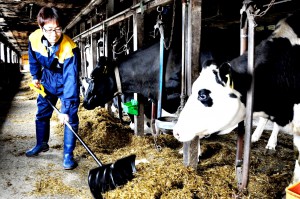Shingo Oka
In Hokkaido, which produces half of the total raw milk supply in the nation, farmers and primary agricultural cooperatives are working to recover decline in the region’s milk production due to the increasing number of people giving up farming.
Dairy farmers are actively promoting their products to consumers, while agricultural cooperatives are setting up dairy products companies to maintain the number of cows and create employment opportunities.
In fiscal 2013, Hokuren Federation of Agricultural Cooperatives, which is engaged in sales and marketing of farm products in Hokkaido, was entrusted with 3,758,845 tons of raw milk, down 1.7 percent from the previous year. The drop was especially large in Kushiro and Nemuro districts with many farmers specializing in milk production. The number of farmers who entrust sales of their milk to Hokuren dropped by more than 200 for three years in a row. The situation was made even worse by the poor grass growth and decline in milk quality due to bad weather. Milk entrusted in April decreased 3.9 percent from a year before, indicating that the condition is far from recovery.
Dairy farmers say they are aware of the need to make capital investments to increase their competitiveness, but remain reluctant to do so considering the unclear prospects of the dairy market.
Kazutaka Matsui, 36, who runs a farm with 70 milking cows in Betsukai, Hokkaido, says it is difficult to make investments to build new cowsheds amid rising prices of construction materials. Prices of undelivered cows and calves remain high, but Matsui does not expect the situation to last long.
Instead, Matsui is putting top priority on promotion of dairy products, as he believes market expansion of dairy products including milk is indispensable to encourage farmers to make new investments. The youth association of JA Nakashunbetsu, an agricultural cooperative in Betsukai, which is headed by Matsui, has been holding tasting events of dairy products in various places including New Chitose Airport to appeal to consumers in and out of Hokkaido. He says the association members hope to develop their business and rural communities by promoting and selling their own products of which they know well about.
Meanwhile, some agricultural cooperatives in Hokkaido are setting up dairy products companies to prevent reduction in the number of cows, and also provide employment and training opportunities for farmers.
JA Shibecha and JA Shintokucho have made investments themselves to build cowsheds to maintain the current level of milk production in the region.
The number of delivered cows per farm, which has been continuously increasing in recent years, remained flat in 2013, as farmers refrained from expanding their business amid rising prices of construction materials.
JA Shibecha officials stress that they must avoid letting the district deteriorate by taking over land from those giving up farming.
In order to strengthen dairy farming business, it is also necessary to reduce farmers’ labor burdens. According to the JA Hokkaido Chuokai, the prefectural union of agricultural cooperatives, the annual per capita work hours of dairy farmers in Hokkaido is 3,216 hours, as much as 1,000 hours more than people engaged in other occupations. To cope with the situation, some agricultural cooperatives have established total mixed ration (TMR) centers to provide farmers with high-quality feed while shouldering their burden of feed mixing.
(May 27, 2014)


